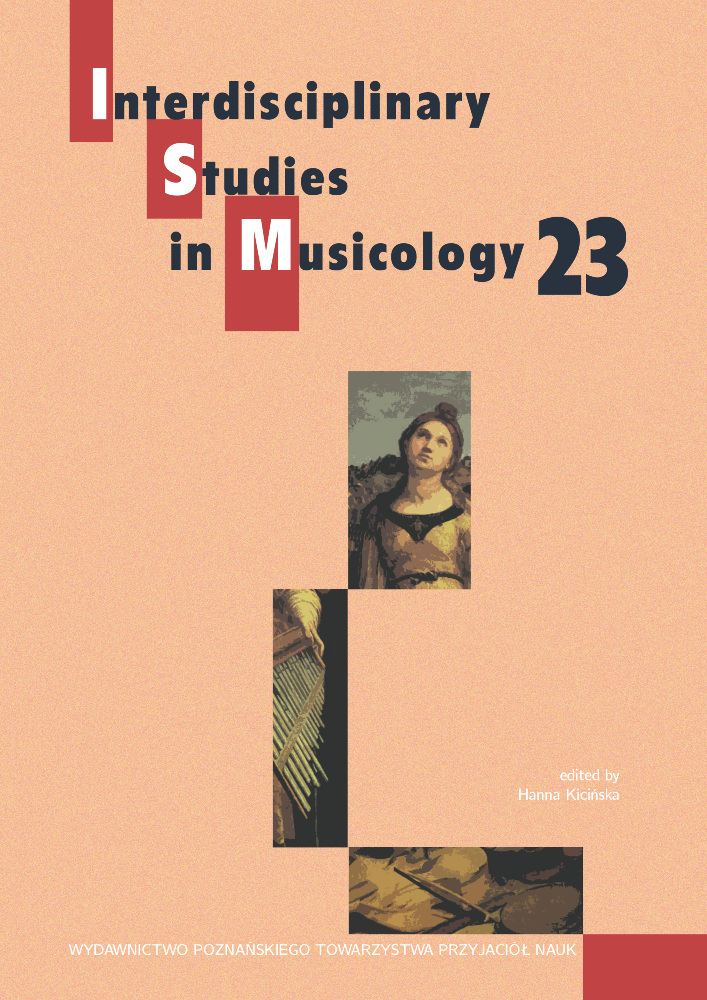Abstrakt
Paulina Rivoli was the first Warsaw Halka and then the first Countess in Moniuszko’s operas. In this article, I will relate how the singer, who at first frowned on Moniuszko’s proposals, launched the performance tradition of two great Moniuszko operas in which she created the title roles. Her immediate successors had to deal with the inevitable comparisons. Unfortunately, Rivoli suffered from serious vocal complaints. This was nothing unusual: phoniatric disorders plagued singers throughout Europe at that time, when massive changes were occurring in the aesthetics of solo singing. Rivoli was excellent in bel canto repertoire – a style of singing favourable to a maturing voice, which allowed her to develop fully. What was Halka’s original singing style? That was probably a mature period for Rivoli’s voice, which did not necessarily correspond to the notion of a modern, very ‘light’, even Donizettian approach to singing this role. Some of the circumstances surrounding the twilight of Rivoli’s career allow us to draw a comparison between her and another great singer whose career ended prematurely. Cornélie Falcon famously sang the role of Rachel in Halévy’s La Juive, which contributed to her legendary demise, and she had lost her voice irrevocably five years after her debut. Rivoli and Falcon sang similar repertoire, including Alice in Meyerbeer’s Robert le diable (Falcon’s debut and an early role for Rivoli), Donna Anna in Mozart’s Don Giovanni and Valentine in Les Huguenots, but Rivoli’s downfall was spread over a longer period, as her career lasted more than 20 years. Nor was her loss of voice as drastic as that of Falcon, who was literally left voiceless during a performance of Niedermeyer’s Stradella. Rivoli’s problems grew gradually, peaking after the premiere of The Countess [Hrabina]. It was probably this last burst of energy that ultimately depleted her powers altogether.
Bibliografia
Chmara-Żaczkiewicz, B. (2004). Rivoli Paulina. In (E. Dziębowska, Ed.). Encyklopedia muzyczna PWM [Encyclopedia of Music, PWM.], pe-r, (pp. 421–422). Kraków: Polskie Wydawnictwo Muzyczne.
Diamond. (1837, August 22). Aus Warschau. Neue Zeitschrift für Musik, 15: 59–60.
Gazeta muzyczna. (1860, June 6). n/a. Ruch Muzyczny, 23: 383–384.
Grubowski, J. (2000). ‘Żydówka’ w teatrach polskich [La Juive in Polish theatres]. In Żydówka (programme of a production at the Teatr Wielki in Poznań), (K. Liszkowska, Ed.), (pp. 31–37). Poznań: Teatr Wielki im. Stanisława Moniuszki w Poznaniu.
Kleczyński, J. (1887, March 12). Wilhelm Troszel [recollections of the late artist]. Echo Muzyczne, Teatralne i Artystyczne, 180: 135–136.
Kronika krajowa [The national chronicle] (1857, July 29). n/a. Ruch Muzyczny, 18: 137
Kurier Warszawski, 1901/346, 6.
Kutsch, K.-J. (2003). Großes Sängerlexikon, iv. Munich: De Gruyter Saur. DOI: https://doi.org/10.1515/9783598440885
Kydryński, L. (1994). Gałganduch [Der böse Geist Lumpacivagabundus]. In Przewodnik operetkowy [Guide to operetta], (pp. 87–89). Kraków: Polskie Wydawnictwo Muzyczne.
Moniuszko, S. (1969). Listy zebrane [Collected letters] (W. Rudziński, Ed.). Kraków: Polskie Wydawnictwo Muzyczne.
Münhcheimer, A. (1900, December 8). Jeszcze o ‘Halce’ [More on Halka]. Echo Artystyczne, Muzyczne i Teatralne, 49: 578–579.
Najjaśniejszy Pan… [His Majesty…] (1856, October 12). n/a. Kurier Warszawski, 268: 1385
Nowakowski, E. (1891). Dawne szkoły muzyczne w Warszawie [Old music schools in Warsaw]. Echo Muzyczne, Teatralne i Artystyczne, 35: 440.
Orman, E. (1988). Paulina Rivoli. Polski Słownik Biograficzny [Polish Biographical Dictionary], t. 31, (pp. 319–321). Wrocław: Wydawnictwo Zakładu Narodowego im. Ossolińskich.
Orman, E. (1991–1992). Ludwika Rywacka (z domu Mrozowicz) [Ludwika Rywacka (née Mrozowicz)]. Internetowy Polski Słownik Biograficzny [Polish Biographical Dictionary], t. 33, (pp. 592-593). Wrocław: Wydawnictwo Zakładu Narodowego im. Ossolińskich.
Puc, B. (1883). Z dziejów teatru polskiego [From the history of Polish theatre]. Biesiada Literacka, 376: 169.
Rivoli – Halka. (1858, March 10). n/a. Ruch Muzyczny, 10: 79–80.
Rivoli Ludwika. (1973). n/a. Słownik biograficzny teatru polskiego 1765-1965, [Biographical dictionary of Polish theater 1765-1965], p. 595 Warszawa: PWN.
Rivoli, Rywoli Paulina. (1973). n/a. Słownik biograficzny teatru polskiego 1765-1965 [Biographical dictionary of Polish theater 1765-1965], p. 595. Warszawa: PWN.
Rivoli, Rywoli Wacław. (1973). n/a. Słownik biograficzny teatru polskiego 1765-1965 [Biographical dictionary of Polish theater 1765-1965], p. 595. Warszawa: PWN.
St. Sk. (1837, September 9). [Na pokoiach zamkowych…] [On the castle rooms…]. Kurier Warszawski, 257: 1245–1246.
Stromenger, K. (1972). Donizettiego Łucja z Lammermooru [Donizetti’s Lucia di Lammermoor]. In Łucja z Lammermooru (programme of a production at the Teatr Wielki – Polish National Opera in Warsaw). Warszawa: Opera Narodowa.
Sz…..ski, L. (1838a, July 16). [Wielki Teatr. Robert diabeł.] [The Grand Theatre. Robert le diable]. Gazeta Warszawska, 186: 4–6.
Sz…..ski, L. (1838b, July 22). [Literatura i sztuki piękne.] [Literature and fine arts] Gazeta Warszawska, 192: 3.
Szczęśliwe przepłynięcie Charybdy [A fortunate crossing of the Charybdis]. (1974, December 4). b/a. Wiek, 267: 3.
Wizerunek Pauliny Rivoli [The image of Paulina Rivoli]. (1901, December 15). n/a. Kurier Warszawski, 346: 6.
Wkrótce opera ‘Halka’ [The opera ‘Halka’ coming soon]. (1865, July 24). n/a. Kurjer Warszawski, 165: 865-866.
Licencja
Prawa autorskie (c) 2023 Hanna Kicińska

Utwór dostępny jest na licencji Creative Commons Uznanie autorstwa – Bez utworów zależnych 4.0 Międzynarodowe.

